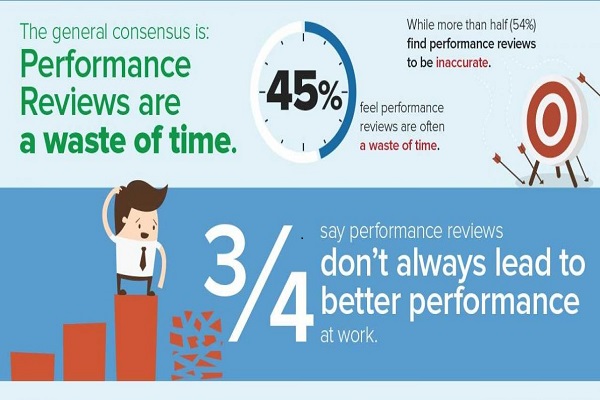60% employees say performance appraisals are a waste of time, 70% say no idea how they are evaluated: Survey
Organisations need to make staff appraisals more transparent and useful as most employees are neither fully conversant with the process nor do they see them as a worthy task to perform.
Majority of the employees find performance reviews in their organisations opaque, cumbersome and a waste of time, reveals a TimesJobs survey, ‘The Performance Review Puzzle’, of more than 1,200 employees in various kinds of organisations.
Sixty per cent employees said the performance review was a waste of time.
Most employees are not even fully aware of the process of evaluation. Seventy per cent said they did not know how they were evaluated. Not surprisingly, 85 per cent were not aware of the end-to-end process of performance review.
Ninety per cent found performance review forms complex and cumbersome.
Outcome of appraisals never left 35 per cent satisfied while 25 per cent had been rarely satisfied. Only 10 per cent said they were always satisfied. Thirty per cent were sometimes satisfied.
A huge 95 per cent said they were not trained by the human resource department to fill in the review form.
Here’s how you can crack the appraisal test
If you dislike the process and ares stressed about it, here is a way out. Follow these simple tips and and ace that appraisal meeting
ACCEPT IT
You can reduce your stress if you stop thinking of your annual appraisal as a report card and instead as a starting point for a new year of growth.
ASSESS THE SERIOUSNESS
Pause and assess the seriousness with which your organisation treats performance reviews. Is it simply a mandatory process that HR enforces but no one takes seriously till the last day? Is it something that is core to the culture and managers treat it as their number one priority? If it is the former, you have lesser cause for worry. Your manager will treat it casually too. Thus, you can take the feedback and discussion with a pinch of salt. Use the opportunity to explore your own thinking and the future of your career.
DO YOUR HOMEWORK
Refer to your emails, journal notes, code libraries etc to list out projects and teams you have worked with. Thereafter make a note of the targets that were allocated or expected and your measurable performance against each. Add on non-measurable contributions you made to the team or projects. Finally jot down where you missed the mark or could have done better. Where possible make sure you have supporting emails and evidence handy. This list is your preparation for the meeting.
FILL UP THE FORMS
If your firm has an annual appraisal process, make sure your meeting happens. Where there is a process for filling up a form—get it done well in time.If a self-evaluation is mandatory, use your homework list from above to write down your evaluation. Even if there is no self-evaluation involved,it is a good idea to share a pre-meeting email with your boss listing your achievements from the previous year along with what you hope to achieve the next year. This email helps your manager refresh his memories and serves as a trigger for an early meeting. If you had multiple managers or your manager is likely to delay your appraisal for any reason, involve the HR.
DUMMY THE SCORECARD
Does your organisation have a scorecard that the evaluator is expected to fill? Obtain a copy of the same and put yourself in your manager’s shoes to think through and fill up your scores objectively. Justify why you would give yourself a certain score and think through incidents and interactions that justify that score. This gives you a platform to agree with your manager when your scores match, seek feedback on what went right if your manager rates you higher and share your reasons in case the manager has forgotten your contributions and has rated you lower than expected. Always expect the unexpected. Your manager is only human and may view your performance from a perspective different from yours.
PREPARE TO LISTEN
Now that you are well prepared, approach the meeting like a regular conversation. If you are expecting to be criticised for some aspects of your performance, you may find yourself getting defensive. This is not the best place to be. Your defensiveness will cause you to block out useful feedback and react in a negative manner. Train yourself to listen to criticism without responding immediately. Take notes if you wish to focus your attention and seek time to respond in a day or two where you find the criticism troubling. Move on to other aspects of the discussion especially your future contributions to your employer.
PLAN FUTURE GOALS
Discuss what made you happy at your work in the previous year, which projects you look forward to working on and how you plan to maximise value for the team and your manager. Share ideas regarding the team and the business including what is not working out and how it could be improved. Next, speak about your personal growth and how you want to develop your skills as a professional. If there is any training that you desire for your career, now is the time to discuss it. Record your manager’s views and reactions and suggest a time to get back with your responses and a firm plan.
FOLLOW UP
The most important component of a performance appraisal is what happens thereafter. Ideally you would have taken notes during the meeting. If not, then immediately make a summary. Sleep over it and draft a follow up email. Thank your manager for the meeting, summarise what was discussed and how it helped you. Share your plan for the coming year based on the feedback and seek a quick follow-up meeting to finalise it. The email provides the foundation on which to drive decisions and goals through the year.
